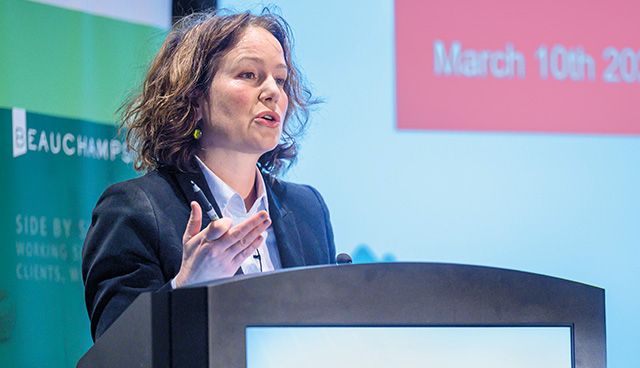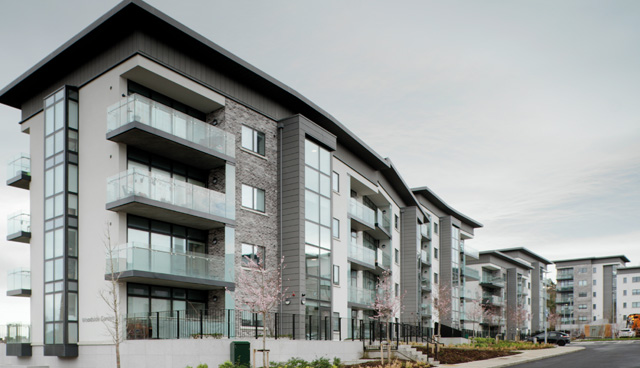
A tipping point for modern methods of construction: Key procurement and contractual issues
18th July 2023
A growing trend meeting diverse and emerging needs
18th July 2023Social housing challenges: A European perspective

General Secretary of Housing Europe, Sorcha Edwards, outlines the top challenges for affordable non-profit housing tenures across Europe and globally.
The first challenge, Edwards believes, is that of building public understanding of cost rental housing, so as to maximise engagement and interest in what she believes is a “potentially very promising” housing model, with her hope that “the European Regional Development Fund may be used to tackle vacancies”.
In Northern Ireland, the intermediate rents policy aims to reduce rent prices to 20 per cent below market value. In the Republic of Ireland, cost rental aims to expand the amount of non-profit social housing.
The differentiation in nomenclature by different organisations, Edwards outlines, can be a source of confusion for the public. “I think it is a misnomer to use the different terms like social housing, cost rental housing, general housing, and general interest housing because there is a lot of language interference.
“What could be termed ‘limited-profit co-operative housing’ is actually cost rental; what is termed ‘co-operative housing’ in Switzerland is actually cost rental. All of these models are essentially housing that factors out the profit incentive.”
Explaining cost rental
“In many countries, you have non-profit finance providers who are backing the schemes,” Edwards states. “That could be a public bank, or public revolving funds. In Ireland, we do not have that and there is an urgent need to analyse the scope for non-profit finance provision in terms of the proportion of subsidies and the proportion of non-profit finance.
“There also might be a difference in terms of the long-term obligation to reinvest any limits on the profits that the entities make. In other countries, there would also be strict auditing and regulation around the reinvestment of any profit.
“The most common issues are the cost of finance, the cost of land, and the pressure coming from unregulated private markets. You also have inflation and interest rates which are making it very difficult, as well as the lack of labour and the cost of construction. There is real pressure to innovate and bring down the price of construction. There is the challenge of competition for the land with private players.”
Wider European policy context
Edwards emphasises the importance of ensuring that the green agenda being pursued by the EU takes a holistic approach, being acutely aware of the needs of those on lower and middle incomes.
“The European Green Deal, if it is implemented correctly, can help us tackle energy poverty, and can lead to better housing conditions,” Edwards says. However, she warns that: “If the Green Deal is not implemented correctly, it could lead to undesirable and negative consequences. So it is vital that we get the balance right with all of this.”
“We cannot allow the agenda on affordable housing to be set by the private sector.”
General Secretary of Housing Europe, Sorcha Edwards
A further challenge raised by Edwards is the lifting of the break on EU state aid rules, which was implemented over the Covid-19 pandemic. Amid this backdrop, she states the need for “a recognition of the real amount of public finance that is now needed to tackle the crises in housing and the climate” and that “we have clear political space and fiscal space to make that investment which is badly needed”. She also reiterates that spending in these areas must be characterised as an “investment, not a cost”.
“Green taxonomy and the growing impact of environmental and social governance in the financial sector are very important; we have to make sure that the social impact is in line with the constructive work being done on the ground. We cannot allow the agenda on affordable housing to be set by the private sector.”
Emphasising the three key metrics of affordability, availability and sustainability, Edwards again emphasises the need for a balanced policy approach. “We have to go green, but we have to go green in an inclusive fashion,” she states, adding: “We are constantly bringing together this benchmarking of systems, looking at what tools countries have to tackle the crisis, and how housing systems are equipped to tackle the type of societal challenges that we have.”
European examples
Edwards summarises the policy approaches taken by the governments of the Netherlands and Portugal. “The Dutch Government has proposed quite a strong intervention in the private rented market. This is now being debated in Dutch courts. They will step in and reduce rents according to a points system linked to the quality of the homes.
“They are also looking at reducing short-term tenancies; something that was introduced in 2016 intended as a way to increase the speed of supply; it did not work out that way. Now, they are looking back to have permanent tenancies.”
In Portugal, meanwhile, Edwards explains how the Portuguese Government is intervening “to stop the golden visa scheme and to increase the pressure to bring vacant homes back into use”.
She concludes by outlining the challenges of ensuring that government policy is consistent with the needs of low and middle income earners, and how Housing Europe is considering these factors in its research. “We are examining the social impact of having a strong limited profit sector because they can push the issue there. It can be issues like circularity, making sure biodiversity does not suffer from retrofitting, looking at how we can combine approaches, and bringing stock back into use.”
| Sorcha Edwards is the General Secretary of Housing Europe, the European Federation of social, affordable, and co-operative housing, a role she has held since 2014. The sector manages 25 million homes and delivers over 200,000 new homes and renovations annually. |








